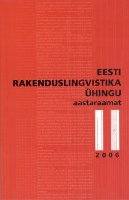Kivinemisnähtusi vene üliõpilaste kirjalikus eesti keeles
Evidence of fossilization in the written Estonian language of Russian students
Author(s): Elle Vaimann, Raili PoolSubject(s): Language and Literature Studies
Published by: Eesti Rakenduslingvistika Ühing (ERÜ)
Keywords: language learning; language errors; fossilization; stabilization; second language speaker; Estonian as L2; Estonian language
Summary/Abstract: The article examines the phenomena of fossilization and stabilization as reflected in the language errors in the written work of students of Estonian as a second language. The survey studied of the examination essays of a group of 21 Russian speaking students from the Department of Estonian as a Foreign Language at the University of Tartu. There were examined two essays with the timescale distance of 2–3 years from each student. The deviant structures of the essays, including lexical and grammatical errors, were recorded and classified. The number of errors totalled 784 in the earlier essays and 452 in the later essays. The comparison of the total number of errors and error types in the two essays reveals the progress in the learners’ language and the cessation of the mistakes as a group and individually. The largest group of mistakes that had fossilized was in the word order, which gave the highest number of errors in both essays. The second largest group was the errors in word choice, which showed that stabilization in both: the grammatical and the lexical level. As a group stabilization was noted in the choice of total and partial object, whereas progress was noted in inflectional formation, word building and government. Individuals showed a wide range of performance for particular error types. For example, when some students made fewer errors in their later essays, then some informants actually made in their second essay more word order errors than in their first one. However, errors in the selection of long or short pronoun forms are common to only few informants. The results show that a study group can only provide a limited picture of fossilization, because individual performance can be overshadowed. A more concrete assessment of fossilization requires longer-term observation on an individual basis.
Journal: Eesti Rakenduslingvistika Ühingu aastaraamat
- Issue Year: 2006
- Issue No: 2
- Page Range: 203-218
- Page Count: 15
- Language: Estonian

